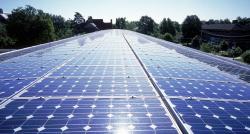
Society
Main Category
Era
Date Created
Location Country
us
Coordinates
34.685169, 135.49942
City
Osaka
Country
Creator
In 1954 three researchers at Bell Laboratories published the results of their discovery of the world’s first practical ‘photovoltaic’ (henceforth abbreviated by ‘PV’) cell which was capable of converting sunlight into electricity, first at 4% and later at 6% conversion-efficiency[1]. In 1959 Sharp Corporation began R&D of silicon monocrystal PV-cells, with mass production starting in 1963[2], and commercialized a variety of mono/multi-crystalline PV-cells for everything from satellites to lighthouses, and industrial applications to residential use[2]. The annual production capacity has since grown to 500 MW with plans to double it to over 1GW by constructing additionally a new big plant in Sakai City in Osaka Prefecture with the start of operations in fiscal 2009, and moreover the cumulative production volume reached to 2GW at the end of 2007 for the first time in the world. It is estimated that the current world’s cumulative production volume is 8GW, meaning that Sharp has produced a full one-quarter of that[3].
Sharp’s pioneering works of developing and commercializing PV-cells have been achieved mainly in the fields of consumer electronics, public facilities, space satellites, and industrial and residential applications. Especially, untiring efforts of the project teams devoted to the development and implementation of PV-technologies during the long period, ranging from the start of R&D of monocrystal PV-cells in 1959 to the mass production of amorphous PV-cells in 1983, constructed the firm foundation for the industrialization of PV technologies, as described in what follows.
Sharp Corporation pioneered the development and commercialization of photovoltaic (PV) cells for applications ranging from satellites to lighthouses to residential uses. From the beginning of research into monocrystal PV-cells in 1959, to the mass production of amorphous PV-cells in 1983, this work contributed greatly toward the industrialization of photovoltaic technologies and toward the mitigation of global warming.
Image Credit
Courtesy NREL
Image Caption
Silicon solar array connected to the roof of a commercial building.


